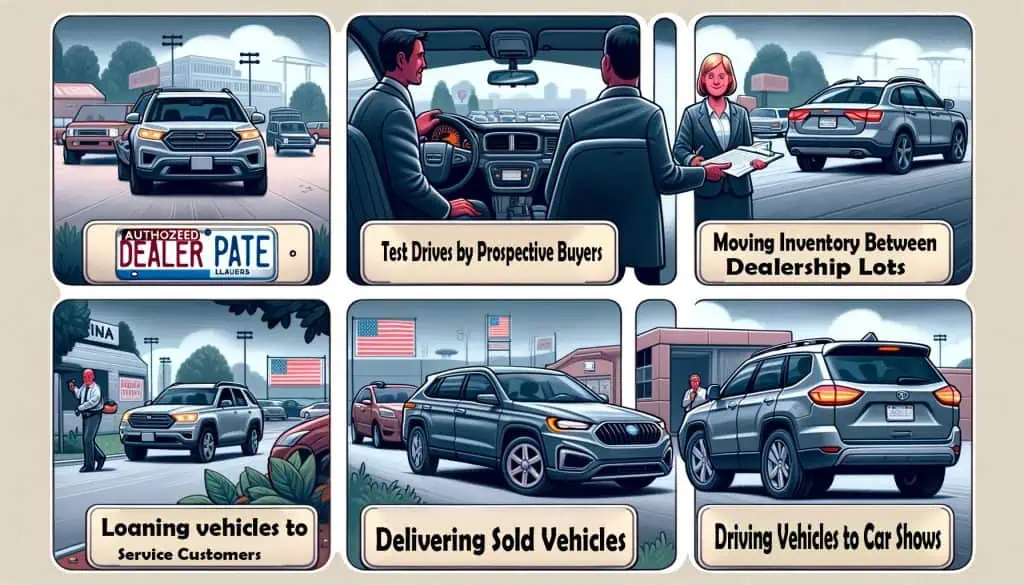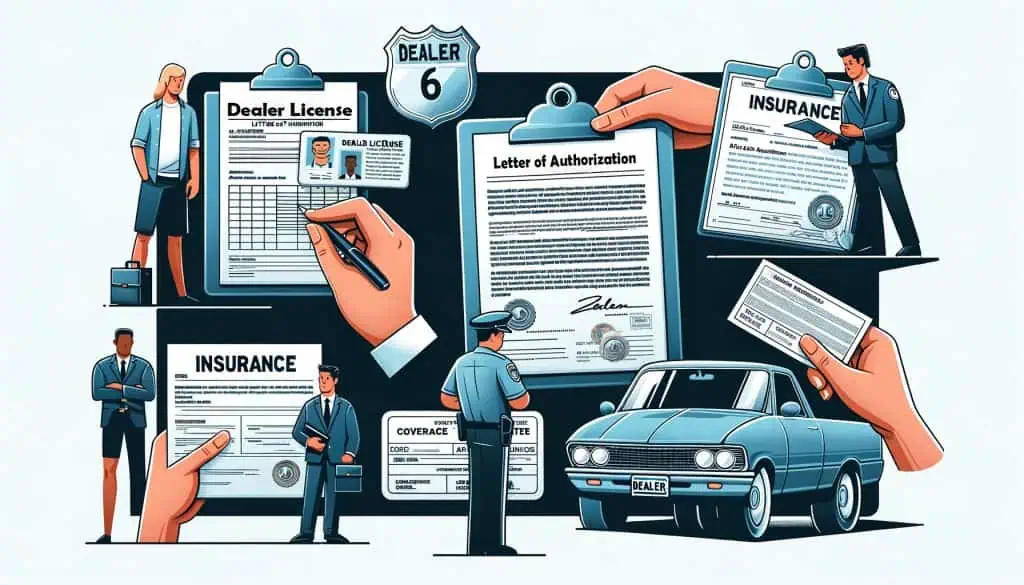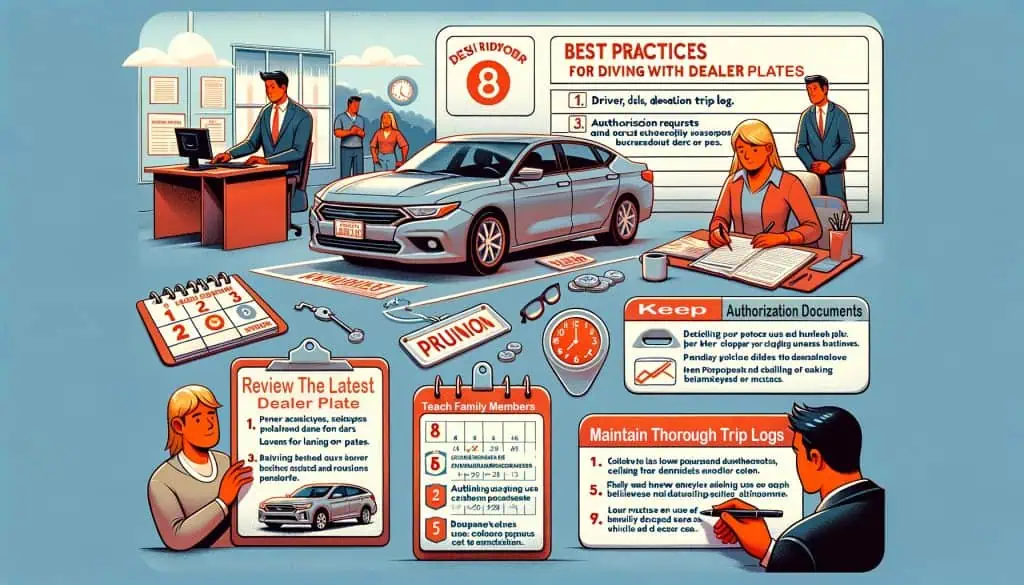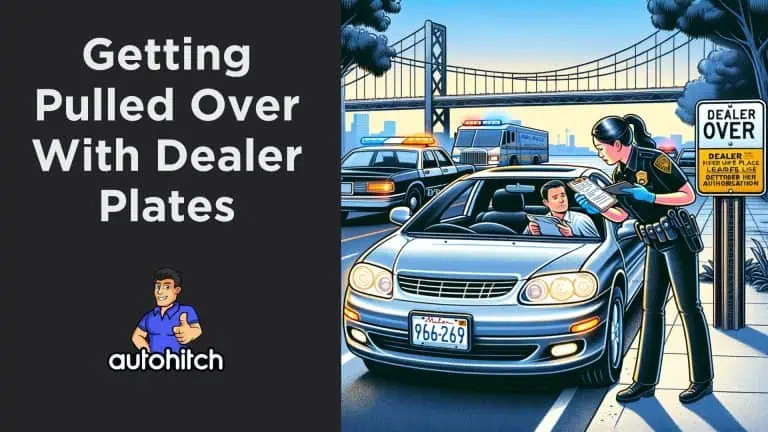If you’ve recently purchased a vehicle from a dealership, you may be wondering if you can legally drive with the dealer plates still attached.
As a former licensed car dealer in Florida, I often get questions about using dealer plates properly.
In this guide, I’ll cover everything you need to know about dealer plates and best practices for driving dealer-plated cars.
Relevant Articles To Read:
Table of Contents
What Are Dealer Plates?
Dealer plates, also known as dealer license plates or special plates, allow dealerships to legally operate vehicles that are part of their inventory for sale or lease.
Instead of individually registering each car, dealer plates let salespeople, technicians, prospective buyers and other authorized users drive unregistered vehicles on public roads for business purposes.
Dealer Plate Laws and Regulations
Though most states have similar regulations, dealer plate laws do vary significantly nationwide. Be sure to consult your state’s specific statutes.
Generally, dealers must register for dealer plates with a state agency like the DMV. The number of plates issued is based on sales volume and full-time employees.
Here are some of the most common dealer plate rules:
- Dealer plates can only be used by dealership owners, officers, employees or customers test driving vehicles.
- Plates should be securely fastened to the rear of cars and not displayed in windows.
- Vehicles must be held in inventory for sale or lease to use dealer plates.
- Driver’s often need to carry a letter of authorization from the owning dealer.
- Misusing plates to dodge taxes or registration fees is illegal.
Authorized Uses of Dealer Plates
Authorized business uses of dealer plates typically include:

- Test drives by prospective buyers
- Moving inventory between dealership lots
- Delivering sold vehicles to customers
- Driving vehicles to car shows, exhibits or auction
- Loaning vehicles to service customers
Dealership owners, employees and family members may also use dealer plates for personal errands and commuting depending on local laws.
Restrictions on Dealer Plate Usage
Conversely, regulations prohibit use of dealer plates on:
- Vehicles already titled or registered
- Trucks pulling trailers or other vehicles
- Parts delivery vehicles or wreckers
- Rented or leased vehicles (unless loaners for service customers)
You also cannot lend plates to friends/family or use them primarily to avoid taxes and registration.
Consequences of Misusing Dealer Plates
- Traffic tickets and fines
- Financial penalties on dodged taxes and fees
- Suspension or revocation of the dealership’s license
- Vehicle impoundment
Penalties for individuals depend on the offense and state. But misusing dealer plates often constitutes a misdemeanor.
Getting Pulled Over With Dealer Plates
It’s inevitable – improper or suspicious dealer plate use will eventually attract law enforcement attention. Here’s what to expect if an officer pulls you over:
What to Expect From Law Enforcement
Since regulations vary widely, officers typically investigate potential dealer plate misuse on a case by case basis during traffic stops.
They will likely ask questions to determine if usage complies with state law. Common inquiries include:
- Requesting driver’s license and proof of insurance
- Purpose and intended duration of the trip
- Relationship to vehicle dealership
- Proof of authorization documents
Failure to provide sufficient answers or documentation can warrant further investigation or penalties by an officer.
Documentation You May Need
Like drivers in many states, you may need to show paperwork that proves compliance with dealer plate statutes, including:

- Dealer license for officers to verify business/employment
- Letter of authorization signed by the dealer
- Insurance papers – often coverage exclusions with dealer plates
- Sale or purchase paperwork if driving a recently bought vehicle
Having documents readily available if stopped curbs problems. But you may still face sanctions for legitimate misunderstandings. Consider additional steps like contacting your DMV regulator for updated rules.
Using Dealer Plates When Buying From a Dealership
Many folks drive home using temporary dealer plates when they purchase new and used vehicles. Besides verifying proper usage, buyers should also take precautions like:
Buying Considerations With Dealer-Plated Cars
- Inspecting vehicle history reports
- Checking title status
- Getting promises about condition in writing
- Having a mechanic check over the car beforehand
- Confirming expected delivery date of permanent plates
Test drives with dealer plates pose fewer risks. But due diligence prevents major issues down the road.
Insurance and Registration With Dealer Plates
Another key consideration is verifying insurance coverage with vehicles using dealer plates. Since they are meant for brief test drives, permanent buyer insurance policies may exclude coverage.
The same goes for registration – dealer plates are not a workaround.
You will still need to formally register the vehicle in your name within a short window after purchase. Insurance and registration should coincide with arrival of permanent plates.
Best Practices For Driving With Dealer Plates

Though convoluted, correctly using dealer plates comes down to mindfulness, preparation and verification. Here are my top tips:
- Maintain thorough trip logs noting driver, dates, locations etc. These may help justify usage if questioned.
- Keep authorization documents and business IDs on hand when driving dealer-plated cars.
- Review the latest dealer plate statutes in your state annually or after major life events.
- If loaning vehicles or plates, collect written requests and thoroughly vet borrowers first.
- Teach family members and new employees the proper uses as well as penalties for misusing plates.
- Check dealer plate usage with your insurance agent to avoid denial of collision claims.
- Seek legal counsel if you have uniquely ambiguous use cases. An ounce of prevention against violations is invaluable.
Though rules differ, those tips will help avoid missteps nationwide. Of course, guidelines are more intricate than I can cover here. So partner with advisors and regulators to ensure full compliance in your state.
Frequently Asked Questions About Driving on Dealer Plates:
How long can I drive with dealer plates?
Laws vary, but most states allow you to drive on dealer plates for only 72 hours to 90 days before requiring personal registration. Always verify local statutes. Exceeding limits risks financial penalties.
Can you drive at night with dealer plates?
Generally, yes, you can drive at night with dealer plates, but some dealers prohibit employee use after hours or impose mileage limits hindering night driving. More police scrutiny of plate misuse occurs at night too. Confirm policies with dealers.
Sources For This Article:
- https://www.ftc.gov/business-guidance/resources/dealers-guide-used-car-rule
- https://www.quora.com/What-are-the-laws-about-driving-with-dealer-plates-on-your-vehicle
- https://www.reddit.com/r/legaladvice/comments/ah459i/pulled_over_for_dealer_plates/
- https://www.reddit.com/r/arizona/comments/3aimn2/dealer_plates/?rdt=55323
- https://www.dealertraining.org/dealer-license-plates.html



